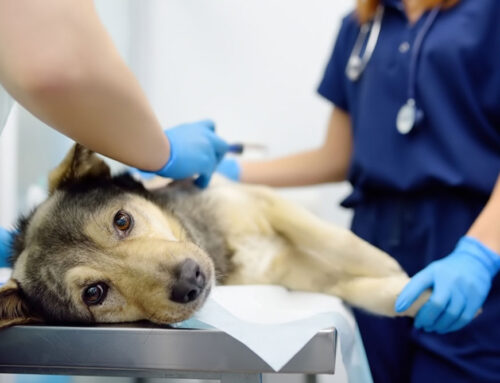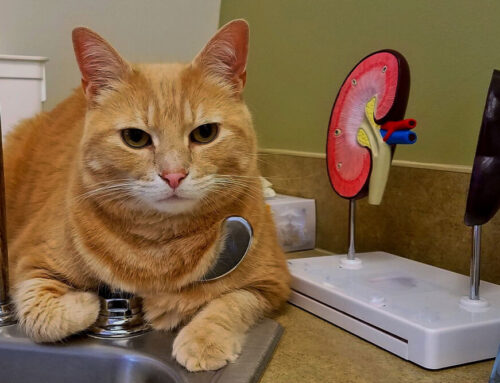As the seasons shift in Memphis, Tennessee, many pets begin to show subtle signs that something isn’t right—more scratching, red skin, watery eyes, or that telltale head shake. If this sounds familiar, your pet may be one of many affected by seasonal allergies.
At Southern Crossing Animal Hospital, we understand how frustrating—and at times overwhelming—this can feel. You’re trying to give your pet the best life possible, and we’re here to help with expert insight, empathetic care, and practical strategies you can use right away.
Recognizing the Signs of Seasonal Allergies
Allergies don’t always present the same way in every pet, but here are the most common symptoms to watch for:
Skin-Related Signs
- Persistent scratching or licking, especially paws, ears, belly, or groin
- Red or inflamed skin
- Hives, hair loss, or bald spots
- Recurring hot spots or skin infections
Learn more about itching in dogs
Other Possible Symptoms
- Ear infections, head shaking, or odor
- Sneezing, coughing, or watery eyes
- Occasional vomiting or diarrhea
- Restlessness, irritability, or disrupted sleep
Some pets even develop facial swelling or difficulty breathing from allergic reactions to insect stings or bites. These symptoms are rare but urgent—if they appear, seek emergency care.
Why These Symptoms Matter
While seasonal allergies may seem like a nuisance at first, they can cause real suffering over time. That cycle of scratching and licking can:
- Break down the skin’s protective barrier
- Invite secondary bacterial or yeast infections
- Cause chronic thickening, scarring, or darkening of the skin
- Increase your pet’s sensitivity to other allergens
Even pets with mild allergies deserve relief. And early management can help avoid long-term complications.
What’s Behind Seasonal Allergies in Memphis?
In this region, we see allergy flare-ups most often in spring and fall, driven by:
- Tree, grass, and weed pollen
- Mold spores (especially in humid or damp weather)
- Dust mites
- Insect bites, including fleas
Year-round parasite prevention is essential—even a few flea bites can trigger serious reactions.
Some pets also have genetic predispositions. Breeds like Golden Retrievers, Bulldogs, and Labrador Retrievers are especially prone to atopic dermatitis.
How Allergies Progress Over Time
Without treatment, allergies tend to worsen. What starts as mild itchiness can evolve into:
- Chronic skin infections
- Deep pyoderma
- Recurring ear problems
- Increased food sensitivities
- Behavior changes like anxiety or aggression
The earlier we intervene, the more we can reduce inflammation and break the itch-scratch cycle before it causes lasting harm.
Diagnosis: How We Find the Root Cause
When your pet visits us for allergy concerns, we begin with:
- A full physical exam
- A review of your pet’s history, lifestyle, and environment
- Evaluation of skin, ears, and paws
We may recommend:
- Skin cytology or scrapings to check for bacteria, yeast, or mites
- Allergy testing (intradermal or serum) to pinpoint environmental triggers
- Food trials, if food sensitivities are suspected
This gives us a clearer picture—and helps us build a personalized treatment plan. Learn more about the types of dog allergies: What the AKC says.
Relief Options: How We Treat Seasonal Allergies
Allergy treatment usually involves a multi-step approach that targets both symptoms and causes.
Medications & Therapies
- Antihistamines (like cetirizine or diphenhydramine) for mild cases
- Topical therapies like medicated shampoos or sprays: Explore their role in allergy treatment
- Prescription medications such as Apoquel®, Cytopoint®, or cyclosporine
- Corticosteroids for short-term flare control
- Allergen-specific immunotherapy (allergy shots or oral drops)
Managing Infections
- Antibiotics or antifungal meds for secondary skin issues
- Ear treatments and regular cleaning: How to clean your dog’s ears
Nutritional Support
- Omega-3 supplements
- Hypoallergenic diets: The role of nutrition in itchy pets
Simple Ways to Help at Home
Your daily routine plays a big role in managing allergies:
- Bathe your pet regularly with a vet-recommended shampoo: Why grooming matters
- Wipe paws after outdoor walks
- Keep windows closed on high pollen days
- Vacuum and wash bedding often
- Use air purifiers with HEPA filters
- Avoid walks during peak pollen hours

Getting the Most from Your Vet Visit
When you come in, bring:
- A timeline of symptoms
- Photos or videos of skin flare-ups or behavior
- A list of foods, treats, meds, and supplements
- Questions about options, side effects, and prognosis
You might ask:
- “Is this likely a seasonal or food allergy?”
- “What’s the best place to start with treatment?”
- “Can my pet get long-term relief?”
- “How often should we check in?”
Additional allergy tips from Purdue
Looking Ahead: What’s New in Allergy Care
Veterinary dermatology is evolving rapidly. Exciting areas of research include:
- Biologics like monoclonal antibody therapies
- Gut microbiome studies and immune response
- New techniques for more precise allergy testing
FAQs
Will my pet grow out of allergies?
Usually not—but symptoms can be managed with the right plan.
Can I use Benadryl or Zyrtec?
Sometimes. But dosage and safety vary by pet—check with us first.
Are allergies contagious?
No. Allergies are immune system responses, not infections.
Is immunotherapy worth it?
For many pets, yes. It may take time (6–12 months) but can reduce or eliminate the need for medications.
Your Partner in Allergy Relief
At Southern Crossing Animal Hospital, we know how tough it is to watch your pet struggle with seasonal allergies. Our team is here to help you get clear answers and practical support—whether you’re just noticing signs or dealing with long-standing issues.
We’ll meet you where you are, and walk you toward relief—step by step, season by season.
Reach out with questions. Let’s help your pet get back to feeling like themselves again.








Leave A Comment